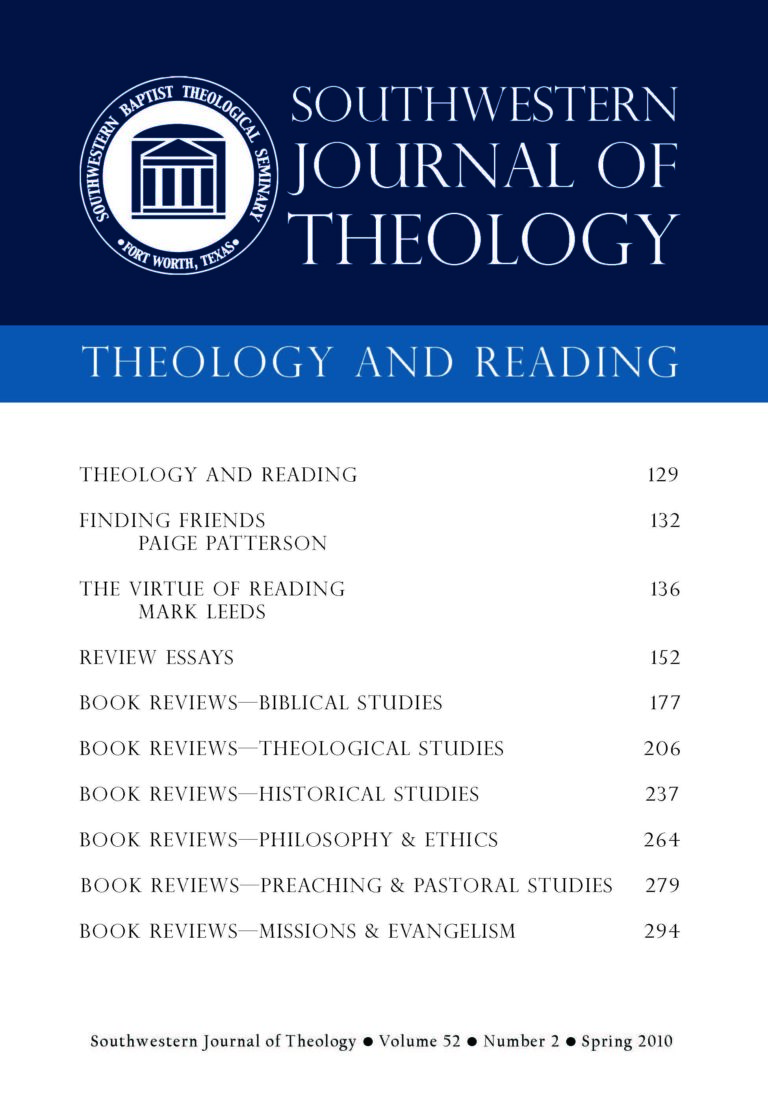
Theology and Reading
Southwestern Journal of Theology
Volume 52, No. 2 – Spring 2010
Managing Editor: Malcolm B. Yarnell III
By John Goldingay. Edited by Tremper Longman III. Baker Commentary on the Old Testament Wisdom and Psalms, vol. 2. Grand Rapids: Baker Academic, 2007. 752 pages. Hardcover. $44.99.
The timeless nature and engaging candor of the Psalms makes the book popular and appealing; compelling and intriguing. The real-world issues they address as well as the enduring theology they express allow readers of all ages and generations to find needed comfort and direction for their lives.
This present volume by John Goldingay is the second on the book of Psalms and the fourth volume in the brief series on Wisdom and the Psalms. Highlighted in this series are the practical and literary warehouses of Job, Psalms, Proverbs, Ecclesiastes, and Song of Songs.
The Introduction to the Commentary on Psalms is included in the first volume of the series only and addresses the historical and literary background issues of the book. Goldingay acknowledges that the divisions of the three volumes of the commentary on Psalms are somewhat arbitrary, though this present volume addresses books two and three of the Psalms.
The Introduction also accentuates the integral role the book of Psalms has with the history and worship of the people of God. Goldingay argues that the Bible “assumes that we do not know instinctively how to talk with God but rather need some help with knowing how to do so” (22).
Using his own translation of each Psalm, Goldingay deftly explores each chapter with careful attention and frequent expository notes. Each chapter also includes sections on interpretation and theological implications. As such, the structure of the work is clear and easy to follow. In addition, the work includes a glossary at the end examining many of the terms with which the commentary interacts throughout. Finally, the commentary is well-documented and contains a thorough bibliography and helpful indexes.
Goldingay’s interaction with the Hebrew text is careful, but not cumbersome. He also emphasizes the creativity of the psalmists and analyzes the literary devices they employ. In addition, he also examines each chapter within the broader context of Scripture and indicates both its use in the New Testament as well as its contemporary application.
Significant psalms highlighted in this volume include Psalms 42, 43, and 53, which deal with questions of the absence of God; Psalm 44 which speaks to those coping with defeat; Psalms 49 and 73, which address those dealing with death; Psalm 51 with its heartfelt depiction of the pain of sin and by the joy of forgiveness; Psalm 59, which speaks to those dealing with fear; Psalm 69 for those dealing with persecution; and, Psalm 75, emphasizing the importance of waiting on God’s time.
Though the expressed target audience of this work is primarily current and future ministers, anyone interested in the study of God’s Word through the richness and beauty of the Psalms will find this volume invaluable. This series will be a mainstay for theological excavation of this great book of the Bible for years to come.





